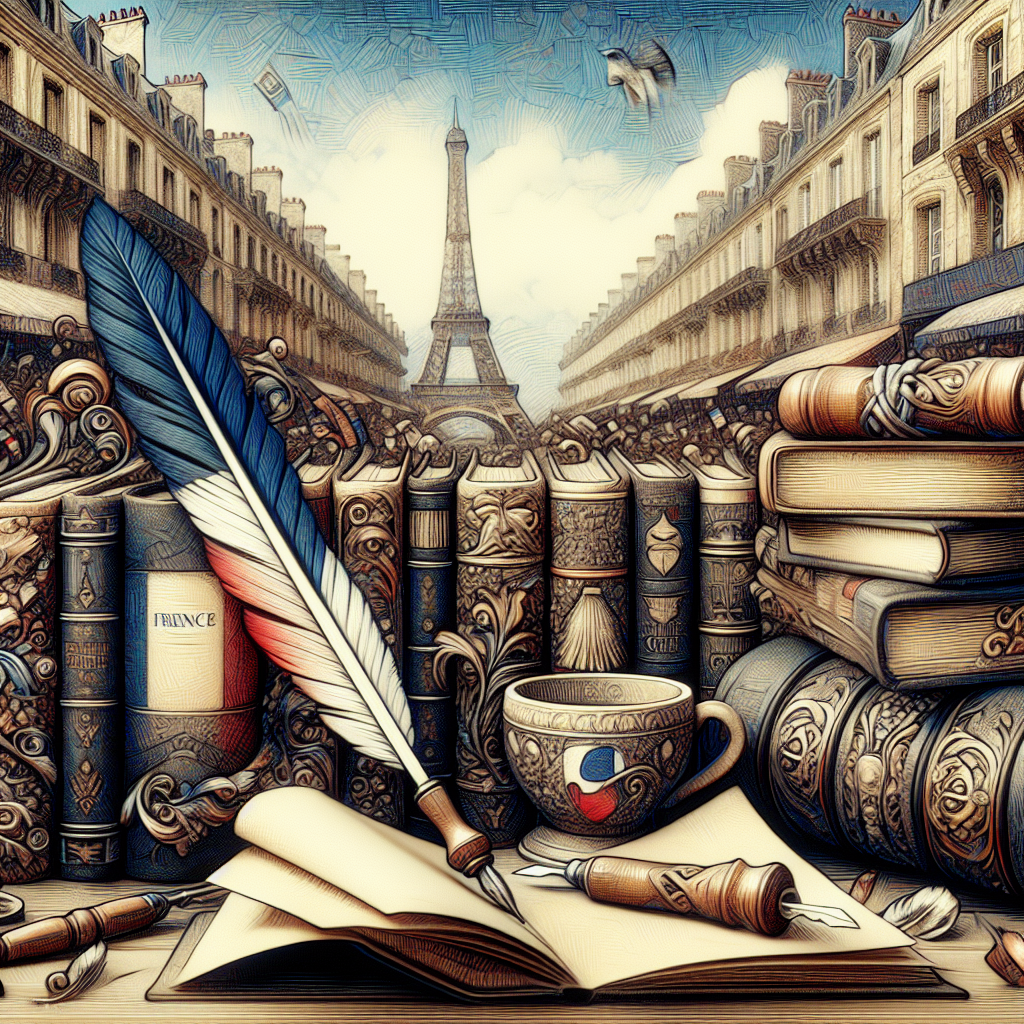When thinking about France, images of art, fashion, and cuisine often come to mind. However, it is important to recognize the significant role that French literature has played in shaping the country’s identity. From the works of Voltaire and Rousseau during the Enlightenment to the existentialist writings of Sartre and Camus in the 20th century, French literature has not only entertained readers but also sparked intellectual, social, and political discussions. Through its exploration of themes such as love, revolution, and human nature, French literature has contributed to the formation of a unique French cultural identity that continues to influence the nation’s values and perceptions.

The Origins of French Literature
The origins of French literature can be traced back to the medieval era, a time when the French language was still developing. During this period, storytelling and poetic traditions played a significant role in shaping the literary landscape. The troubadours, or courtly poets, were particularly influential in popularizing the use of the French language for poetic expression. Their compositions, often centered around themes of love, chivalry, and heroism, laid the foundation for future literary works.
As Europe transitioned into the Renaissance period, French literature underwent a transformation. Renaissance literature in France was characterized by a renewed focus on humanism, the exploration of classical themes, and the rise of the sonnet form. Prominent writers such as François Rabelais and Pierre de Ronsard emerged during this era, contributing to the development of French literature.
French classical literature reached its peak during the 17th and 18th centuries, with writers like Jean Racine, Molière, and Voltaire setting the stage for the modern French literary tradition. This period saw the emergence of neoclassicism, a movement heavily influenced by the classical Greek and Roman literary traditions. It emphasized reason, order, and structure in literature and had a lasting impact on French literary aesthetics.
The Influence of French Literature on Language
French literature has had a profound influence on the French language itself. One of its significant contributions is the standardization of the French language. During the 16th and 17th centuries, writers like François de Malherbe and Cardinal Richelieu played a vital role in establishing a set of grammatical and orthographic rules for the French language. This standardization allowed for greater clarity and uniformity in written and spoken French.
Furthermore, French literature has been instrumental in the development of a literary language. Through their works, writers have shaped the vocabulary, syntax, and stylistic conventions of the French language, creating a distinct literary register. This has not only enriched the language but also provided a platform for artistic expression and experimentation.
Promoting French Cultural Values
French literature has long been seen as a vehicle for the expression of French ideals and the depiction of national character. Through their writings, authors have captured the spirit and essence of French culture, showcasing its diversity, creativity, and resilience.
French literature has often been used to convey and promote the values that are considered essential to the French identity. Themes of liberty, equality, and fraternity, which are at the core of French national values, can be found in numerous literary works. Authors like Victor Hugo and Émile Zola, through their poignant portrayals of social inequalities and injustices, have championed social change and progress.
French Literature as a Tool for Resistance
Throughout history, French literature has served as a powerful tool for resistance, particularly during times of political turmoil and oppression. During the French Revolution of 1789, writers such as Maximilien Robespierre and René Descartes employed their literary talents to rally support for revolutionary ideals and challenge the existing social order.
Similarly, during the World Wars, French literature played a crucial role in resisting foreign occupation and preserving French culture. Writers like Albert Camus and André Malraux used their works to convey the experiences and struggles of the French people, fostering a sense of resilience and national unity.

Romanticizing French Heritage
French literature has played a significant role in the rediscovery and preservation of France’s historical roots. Through their writings, authors have romanticized French heritage, breathing life into historical events, figures, and traditions. Works like Alexandre Dumas’ “The Three Musketeers” and Victor Hugo’s “Les Misérables” have transported readers to different periods in French history, evoking a sense of pride and nostalgia for the country’s past.
Moreover, French literature has celebrated French cultural heritage by emphasizing its unique qualities and contributions to the world. The works of writers like Marcel Proust and Gustave Flaubert have captured the essence of French art, literature, and philosophy, showcasing its influence and significance on a global scale.
The Portrayal of France’s Social Realities
French literature has been a vehicle for exploring and exposing the social realities of French society. Authors have delved into the complexities of social class, shedding light on the disparities, injustices, and struggles that exist within the French social fabric.
Works like Émile Zola’s “Germinal” and Honoré de Balzac’s “La Comédie Humaine” provide vivid portrayals of the lives of ordinary people, highlighting the tensions and challenges they face in a rapidly changing society. Through their writings, these authors have prompted discussions on social inequality, poverty, and the human condition.
Furthermore, French literature has reflected political and social issues, providing a platform for writers to express their opinions and critique the status quo. Whether through satire, allegory, or social commentary, authors like Voltaire and Jean-Jacques Rousseau have challenged prevailing ideologies and fostered intellectual debate.
Exploring French National Identity
French literature has been instrumental in the exploration and representation of French national identity. Through their works, writers have captured the essence of what it means to be French, delving into the intricacies of French culture, history, and values.
French literature has often depicted French identity as a complex and multifaceted concept, encompassing a wide range of experiences and perspectives. It has included diverse voices from different regions, social classes, and backgrounds, reflecting the rich tapestry of French society.
Influential French Literary Movements and Genres
Throughout history, French literature has been shaped by various literary movements and genres that have left a lasting impact on the global literary landscape. Some of the most influential movements include existentialism and absurdism, symbolism and decadence, and naturalism and realism.
Existentialism and absurdism, popularized by writers like Jean-Paul Sartre and Albert Camus, explored themes related to the human condition and the meaning of existence. These movements questioned traditional values and norms, challenging readers to reflect on the purpose and significance of their own lives.
Symbolism and decadence, represented by poets such as Charles Baudelaire and Stéphane Mallarmé, celebrated the power of imagination and symbolism in literature. Their works were characterized by rich, evocative imagery and a departure from traditional literary conventions.
Naturalism and realism, exemplified by authors like Émile Zola and Gustave Flaubert, sought to depict the world objectively, focusing on gritty, realistic portrayals of society and human behavior. These movements aimed to provide an honest and unflinching examination of the human experience.
Prominent French Literary Figures
French literature has produced a multitude of influential figures who have shaped the course of literary history. Among them are Victor Hugo, Molière, and Jean-Paul Sartre.
Victor Hugo, known for his epic novels such as “Les Misérables” and “The Hunchback of Notre-Dame,” is regarded as one of the greatest French writers. His works grapple with themes of social justice, love, and redemption, capturing the hearts and imaginations of readers around the world.
Molière, a notable playwright and actor, is celebrated for his comedic works that satirize and critique French society. His plays, such as “Tartuffe” and “The Misanthrope,” are known for their wit, sharp social commentary, and enduring popularity.
Jean-Paul Sartre, a key figure in existentialist philosophy and literature, explored themes of freedom, authenticity, and the individual’s responsibility in shaping their own existence. His plays, novels, and philosophical essays have had a profound influence on both French and global literature.
French Literature’s Impact on Global Culture
French literature has had a significant impact on global culture, with French literary works being translated and disseminated worldwide. The spread of French literary works has allowed for the exchange of ideas, enriched literary traditions in other languages, and contributed to a broader cultural understanding.
French literature has played a pivotal role in shaping world literature as a whole. Writers like Albert Camus, Marcel Proust, and Gustave Flaubert have inspired generations of writers from all corners of the globe, influencing their styles, themes, and perspectives.
In addition, French literary works have been adapted into various art forms, including theater, film, and music. Plays by Molière and novels by Victor Hugo have been staged and adapted countless times, reaffirming their enduring appeal and cultural significance.
Overall, French literature has played a vital role in shaping the country’s identity, promoting its cultural values, exploring social realities, and influencing global culture. Through their writings, French authors have left an indelible mark on the literary world, ensuring the continued legacy and prominence of French literature for generations to come.
